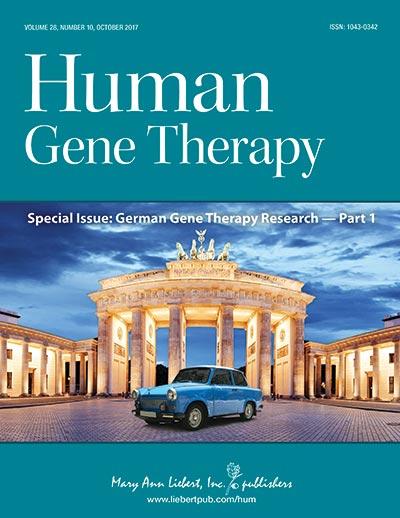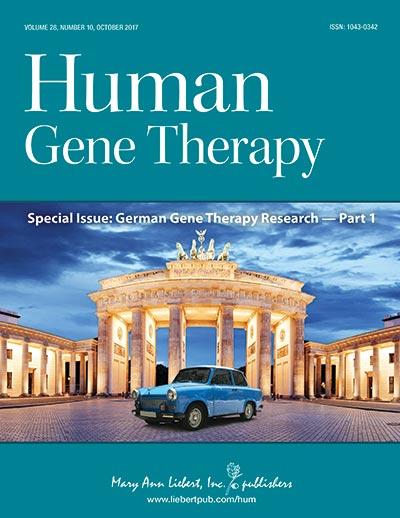
Credit: Mary Ann Liebert, Inc., publishers
New Rochelle, NY, Oct.18, 2017–Virotherapy capable of destroying tumor cells and activating anti-tumor immune reactions, and the use of engineered hematopoietic stem cells (HSCs) to deliver replacement genes that have the potential to cure blood diseases are among the key areas of gene therapy being advanced by German researchers and highlighted in a special issue of Human Gene Therapy, a peer-reviewed journal from Mary Ann Liebert, Inc., publishers. The issue is available free on the Human Gene Therapy website.
The special focus issue entitled "German Gene Therapy Research — Part 1 ," was developed by Guest Editors Christof von Kalle, MD, Boris Fehse, PhD, and Hildegard Büning, PhD. Dr. Büning, Hannover Medical School, is Editor of Human Gene Therapy Methods and serves as Chair of the 25th Anniversary ESGCT Congress, October 17-20, in Berlin.
In the special issue, Guy Ungerechts and Christine Engeland led a team of colleagues from Germany and Luxembourg in coauthoring the review article entitled "Virotherapy Research in Germany: From Engineering to Translation." The researchers present the latest preclinical and clinical research activities to engineer oncolytic viruses, which selectively infect tumor cells, for use in tumor-targeted gene therapy. They discuss the different types of virus platforms being investigated–including adenovirus, arenavirus, measles vaccine virus, parvovirus, and vaccinia virus — and the potential to take advantage of the immunotherapeutic properties of oncolytic viruses and of their use in combination with other types of pharmaco-, radio-, and immunotherapy.
In the review article "Promises and Challenges in Hematopoietic Stem Cell Gene Therapy," Saskia Kohlscheen, Halvard Bonig, and Ute Modlich, Paul-Ehrlich-Institute (Langen), Goethe University (Frankfurt), German Red Cross Blood Service Baden-Württemberg-Hessen (Frankfurt), Germany, and University of Washington, Seattle, describe the state-of-the-art in HSC-directed gene therapy, including viral vector delivery systems, transduction of HSCs, and protocols prior to HSC transplantation. The researchers discuss the main targets for this innovative approach, focusing on immunodeficiencies and inborn errors of metabolism, what has been learned to date from the limiting clinical studies performed, and how best to move forward to overcome the challenges the field still faces.
"The rapid pace of innovation among gene and cell therapy researchers in Germany is striking and significant," says Editor-in-Chief Terence R. Flotte, MD, Celia and Isaac Haidak Professor of Medical Education and Dean, Provost, and Executive Deputy Chancellor, University of Massachusetts Medical School, Worcester, MA. "We are very proud to reflect the impact of German gene therapy science in this special issue of Human Gene Therapy."
###
About the Journal
Human Gene Therapy the Official Journal of the European Society of Gene and Cell Therapy, British Society for Gene and Cell Therapy, French Society of Cell and Gene Therapy, German Society of Gene Therapy, and five other gene therapy societies, is an authoritative peer-reviewed journal published monthly in print and online. Led by Editor-in-Chief Terence R. Flotte, MD, Celia and Isaac Haidak Professor of Medical Education and Dean, Provost, and Executive Deputy Chancellor, University of Massachusetts Medical School, Human Gene Therapy presents reports on the transfer and expression of genes in mammals, including humans. Related topics include improvements in vector development, delivery systems, and animal models, particularly in the areas of cancer, heart disease, viral disease, genetic disease, and neurological disease, as well as ethical, legal, and regulatory issues related to the gene transfer in humans. Its companion journals, Human Gene Therapy Methods, published bimonthly and focused on the application of gene therapy to product testing and development, and Human Gene Therapy Clinical Development, published quarterly, features data relevant to the regulatory review and commercial development of cell and gene therapy products. Tables of contents for all three publications and a free sample issue may be viewed on the Human Gene Therapy website.
About the Publisher
Mary Ann Liebert, Inc., publishers) is a privately held, fully integrated media company known for establishing authoritative peer-reviewed journals in many promising areas of science and biomedical research, including Nucleic Acid Therapeutics, Tissue Engineering, Stem Cells and Development, and Cellular Reprogramming. Its biotechnology trade magazine, GEN (Genetic Engineering & Biotechnology News), was the first in its field and is today the industry's most widely read publication worldwide. A complete list of the firm's 80 journals, books, and newsmagazines is available on the Mary Ann Liebert, Inc., publishers website.
Mary Ann Liebert, Inc.
140 Huguenot St.
New Rochelle, NY
10801-5215
http://www.liebertpub.com
Phone: 914-740-2100
800 M-LIEBERT
Fax: 914-740-2101
Media Contact
Kathryn Ryan
[email protected]
914-740-2250
@LiebertPub
http://www.liebertpub.com
Original Source
http://www.liebertpub.com/global/pressrelease/german-research-advances-in-cancer-and-blood-disorders-reported-in-human-gene-therapy/2274/ http://dx.doi.org/10.1089/hum.2017.138





